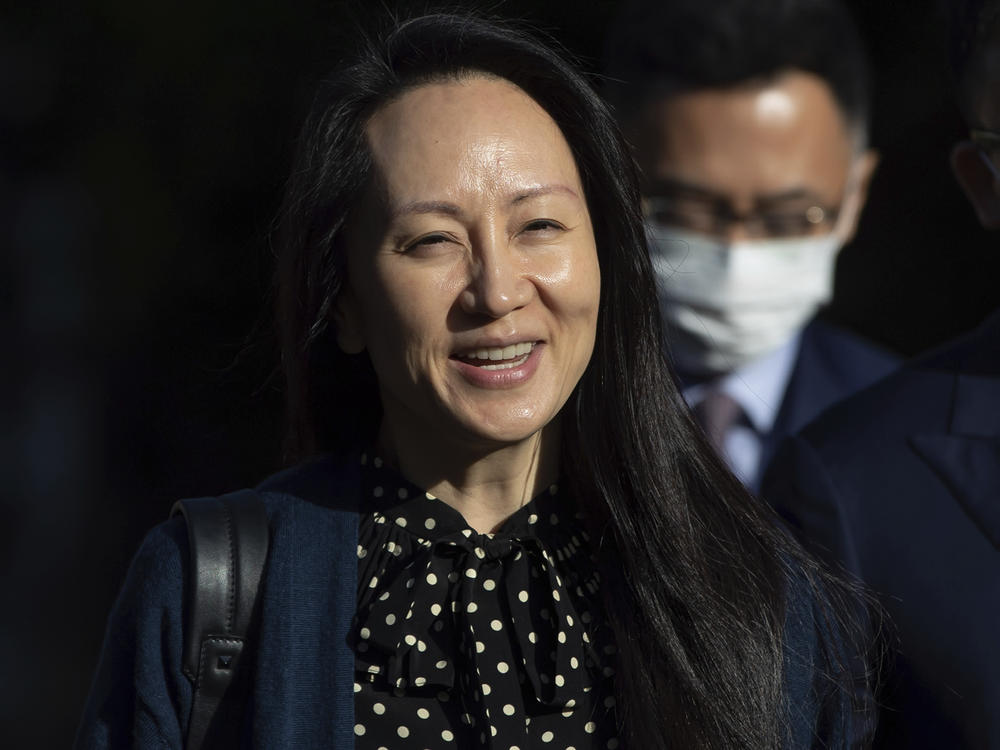Section Branding
Header Content
Canadians Are Released After A Chinese Executive Resolves U.S. Criminal Charges
Primary Content
Updated September 25, 2021 at 2:27 AM ET
BEIJING — China has released two imprisoned Canadian men in exchange for a Chinese Huawei executive detained in Canada, ending a more than 1,000-day ordeal that helped tank U.S.-China relations.
"These two men have gone through an unbelievably difficult ordeal," Canadian Prime Minister Justin Trudeau said at a news conference held shortly after the two Michaels, as they are called, departed China. "For the past thousand days they have shown strength, perseverance, resilience and grace, and we are all inspired by that."
Michael Spavor and Michael Kovrig left Chinese air space on a plane accompanied by the Canadian ambassador to China, Dominic Barton, at around the same time Meng Wanzhou, Huawei's chief financial officer, flew back to China.
Canadian diplomats said the two Michaels were in high spirits but had lost significant amounts of weight during their time in Chinese detention. Spavor is being flown to Calgary, while Kovrig will continue onward to Toronto.
U.S. Secretary of State Antony Blinken said in a statement "we are pleased that [the two Canadian men] are returning home to Canada."
Spavor and Kovrig were suddenly detained in December 2018 on espionage charges, shortly after the U.S. ordered Canada to detain Meng, who is also the daughter of Huawei's founder, on suspicion that she had broken American sanctions on Iran.
The detentions signaled the beginning of an ongoing showdown between the U.S. and China over technology standards and dominance over critical semiconductor components. The U.S. maintains sanctions on the Chinese telecom firm and briefly sanctioned of its major suppliers, the Chinese company ZTE. Last May, the U.S. went one step further, barring companies from selling semiconductors to Huawei if the products were made using American technology.
China has repeatedly denied that their arrest of the two Canadian men was in any way linked to Meng's detention but the timing of their mutual releases underscores the high-stakes game of hostage diplomacy between the U.S., China, and Canada.
Their exchange was a breakthrough enabled by a deal brokered by the U.S. Department of Justice. In a virtual court hearing Friday, Meng pleaded not guilty to charges of bank and wire fraud, but did acknowledge that she misled some financial institutions about Huawei's dealings with Iran. As part of the deal, federal prosecutors will defer prosecution, and if she complies with all of the obligations under that deal, the U.S. will drop the charges against her in just over a year.
China held both men incommunicado and tried both of them in closed trials. Spavor was given an 11-year sentence in August; Kovrig was still awaiting a verdict at the time of his release.
Meng, on the other hand, was allowed to reside in her Vancouver mansion and roam the city for private dinners and shopping sprees at boutique outlets while sporting an ankle monitor, outings eagerly documented by the Canadian tabloids.
NPR's Jackie Northam contributed to this report.
Copyright 2021 NPR. To see more, visit https://www.npr.org.

